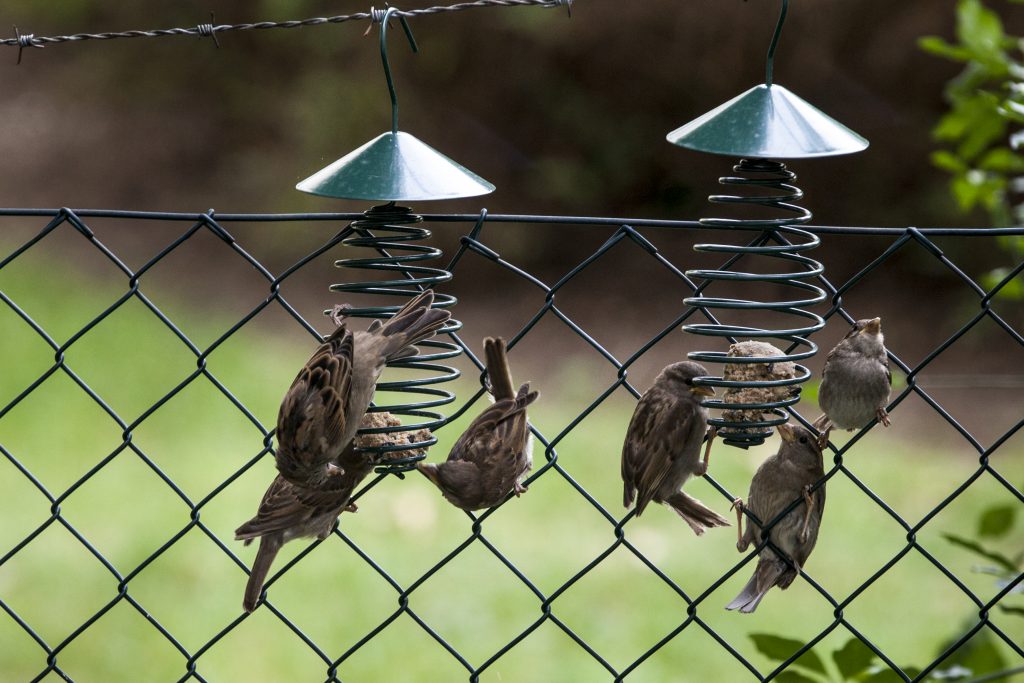Birdwatching Makes You Happy

“Everything is always there in her. Past and future she knows not. The present is her eternity.” (Georg Christoph Tobler on nature)
Do you own a garden? I see it as a place of diversity and also of evolutionary anarchy. Or can you get out into “nature”, woods, fields, vineyards without much effort? If you can’t, you can also hear them in the city. Because if you listen carefully, you will notice that the air is once again filled with a multi-faceted cacophony! The birds are getting into the act and making as much noise as leaf blowers usually do, only nicer. In his book of that name published in 2015, Bernd Brunner writes of “Birdmania” to which, I confess, I too have been addicted for very many years. But, I am fine. Thank you for asking.
I have a feeding station in my garden that I replenish all year round. I agree with Professor Berthold: “Every community should have its own biotope!”1 That’s why I took part in a campaign in our town in 2020 to become more bee-friendly. And I even won a prize! I possess a tiny garden, but it is full of perennials, shrubs, wild roses and small trees. My lawn (or more precisely: my green patch, because by now there are many more surprising things growing on it than just blades of grass) is not mown every week. I’ve sown a small meadow with native plants.
I have a lot going on. I delight in seeing spiders, grasshoppers, butterflies, ants and other creatures in my little biotope (even as an arachnophobe). For the numerous insects attract birds. My garden numbers great tits, crested tits, blue tits, sparrows, greenfinches, blackbirds, starlings, jackdaws, magpies, serins, woodpigeons, blackcaps, robins, great spotted woodpeckers and a pair of green woodpeckers, also called laughing Hans. I must confess, however, that when 6 ducks gathered around the feeder and decimated the supply in no time at all so the blackbirds and tits complained about it, I resorted to counter- offensives.
By the way, in the wonderful book “Critique of Birds” you can learn more about the special characteristics of different bird species, especially if you take human moral concepts as a basis. There is talk, for example, of the “Satanic tit” and of the cold-blooded belligerence of robins. But I do have something to gain from the observations of the Roth brothers. There are tits that clamour and complain incessantly and always fight over who gets to feed first. And when the robin comes to the feeder, even the blackbird waits its turn. Out of fear! Can you believe it?2

In a Europe-wide study, scientists from the Senckenberg Research Centre in Frankfurt compared the contentment of 26,000 people from 26 countries with the respective bird diversity in their environment.3 ” Our results show that bird species richness is positively associated with life-satisfaction across Europe.” And for all the hardliners: a high bird diversity also seems to have an effect on salary. The data should be treated with a degree of scepticism, as it has not been proven that there is a causal relationship between many birds and considerable pecuniary blessings.
But it is enough to feel good and relax in order to recharge one’s batteries for new professional and other adventures. This attitude now seems to be widely accepted. In Bavaria, for example, several long-term care insurance companies support a project for active health prevention: by hanging bird feeders directly in the gardens of old people’s homes, scientists have established that the presence of birds increases well-being.
People also talk about the healing power of nature. For many decades, forest bathing, “Shinri-Yoku”, for example, has been a recognised healing method. In my seminar with managers who have lost their jobs4, I invite the participants to walk for 45 minutes through the beautiful grounds of a monastery. Just 45 minutes (!) of walking slowly, with senses sharpened, without a clear destination, alone and as far as possible without outside disturbances. No task, no goals, just looking, listening and feeling. Quite difficult for some! Afterwards we talk about their “sensual” experiences. Many report that they have heard bird calls or other sounds in the forest again. Or that they let their eyes wander and made new observations they hadn’t made in a long time.
Most of the participants come back from their walk smiling – we know by now about the stress-reducing effect of short walks. Many recalled experiences from their childhood and reported that they had completely lost this ability to “be in the moment”. They also emphasise that due to the hectic pace and demands of their jobs and their family commitments, they had not taken any time at all for a regular, short walk in nature. What a pity. Ages ago Alexander von Humboldt reminded us admonishingly, “Nature must be felt.”

And if you can’t get out, but still want to do something for your emotional well-being with bird calls and other sounds of nature, take a look at YouTube and type in the word “nature sounds”. You will find a multitude of recordings with many hours of bird calls, water splashing and wind blowing, which have been clicked on by hundreds of thousands of others before me. Here is a beautiful example from our forests5.
Grant yourself a break, listen to nature again, no matter how. Especially spring makes it possible. And it makes you happy.
1 You can watch a worthwhile and informative interview (in German) with Professor Berthold here: https://www.youtube.com/watch?v=hVLumaT4HZo.
2 Jürgen and Thomas Roth, Kritik der Vögel, atb-Verlag
3 Science Direct / Ecological Economics March 2021 https://www.sciencedirect.com/science/article/pii/S0921800920322084
4 Harlekin.blog from 25 December 2020
5 YouTube Nature Sounds, an example: https://www.youtube.com/watch?v=W9tR-7UJSpM
Original text: HFI
English translation: CBO
Bildquellen
- Birds 5: Gudrun Müller
- Birds 4: Qube's Pictures / Pixabay
- Birds-2: Gudrun Müller

